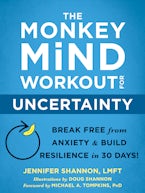By Jennifer Shannon, LMFT, author of The Monkey Mind Workout for Uncertainty
A few days ago, Pat—my ninety-year-old mother-in-law who lives in an assisted living facility—sent us a text from her new iPad. Pat’s texts are often accompanied by a cartoon emoji of herself—sweet ones with hearts for eyes or funny ones with the top of her head exploding. But there was no emoji for this message. She’d just found out that the driver who’d taken her to her doctor’s appointment that morning, whom she had sat next to on the drive, who’d leaned over her to help her with her seat belt when she exited the car, had just tested positive for COVID. All they’d been wearing were thin surgical masks.
Now Pat has been fully vaccinated and boosted, but like anyone her age, she has underlying health conditions. We immediately FaceTimed her. I asked, “How are you feeling about this, Pat?”
“I’m feeling fine,” she said. “There’s nothing I can do about it.”
She told us she was required to be in quarantine and was a little concerned about getting bored, but that was it. She also mentioned how grateful she was to have been able to see one of her sons and grandchildren the weekend before because, “I never know if that might be the last time I see them.”
How did Pat manage to be so calm, grateful, and present? She was under threat. Why was she not anxious, stressed, and worried?
Anxiety and Uncertainty
Anxiety, stress, and worry are all caused by not knowing for certain if we are safe. When we are uncertain about our safety, it is a cue for us to pay attention and do something. Scientists and public health experts have told us what we can do: wear masks, keep social distance, get vaccinated. But while these actions can reduce the chance of our getting sick, they won’t eliminate it.
Uncertainty is and always has been a part of life, no matter what we do. The greater our acceptance of it, the more relaxed, happy, and grounded we will be. Once we have taken all reasonable steps to address possible threats to our safety, we can take another counterintuitive type of action. I call it active acceptance. Helping people actively accept the uncertainty in their lives is the core mission of my work with my clients.
Three Steps to Active Acceptance
1. Expansive Mindset:
We need to update our unconscious “monkey mindset” that says, I can relax only if I eliminate all uncertainty. Replace it with a healthier one, such as, I can influence outcomes, but I can’t control them.
2. Welcoming Breath:
Our default reaction to the sensations of anxiety is to fight them off, tensing our bodies and/or distracting ourselves. Instead, welcome these sensations by consciously relaxing your muscles and breathing the feelings in, allowing them space to play themselves out.
3. Changing Behavior:
Resist our urges to try to eliminate threat that is beyond our direct control. Examples of this are seeking excessive reassurance from doctors, the internet, or friends and family.
The Gift of Uncertainty
Every new thing we’re uncertain about is an opportunity to practice thinking more accurately, increasing our capacity to tolerate negative emotions, and controlling our impulsive behavior. Active acceptance is how we cultivate peace, presence, and happiness in our lives. When we learn to actively accept it, uncertainty becomes a gift.
If you ask Pat how she’s mastered her uncertainty, she’ll tell you with her religious faith. She’ll describe her process differently than I do mine, but one important word we use is the same: acceptance. To be at peace, we all, regardless of faith, must accept the inherent uncertainty of life. And acceptance is not just an idea; it’s an action. Start actively accepting uncertainty today!
Meditation for Uncertainty Recording
Jennifer Shannon, LMFT, is author of Don’t Feed the Monkey Mind, The Shyness and Social Anxiety Workbook for Teens, The Anxiety Survival Guide for Teens, and A Teen’s Guide to Getting Stuff Done. She cofounded the Santa Rosa Center for Cognitive-Behavioral Therapy in Santa Rosa, CA. She is a diplomate of the Academy of Cognitive Therapy.



 Part 2: What to Do When a Client Is Participating in Self-Judgment?
Part 2: What to Do When a Client Is Participating in Self-Judgment?